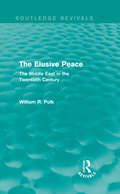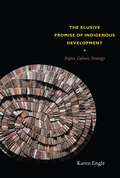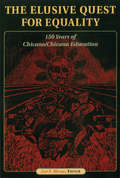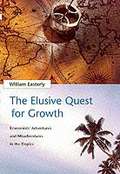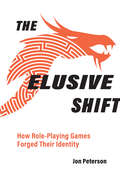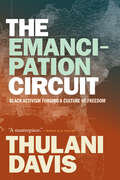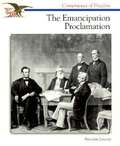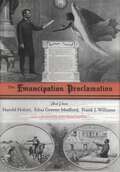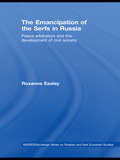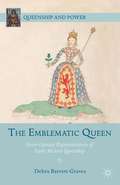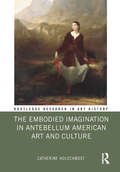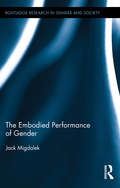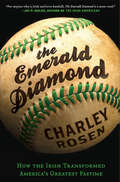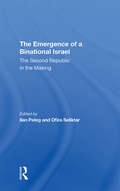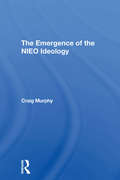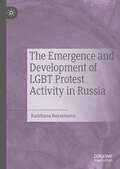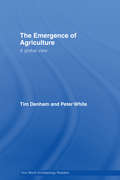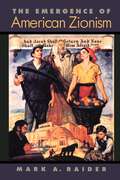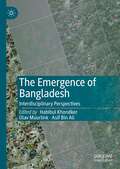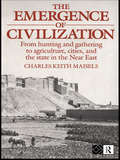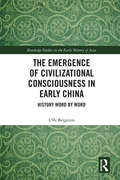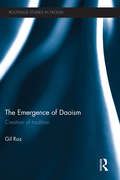- Table View
- List View
The Elusive Peace: The Middle East in the Twentieth Century (Routledge Revivals)
by William R. PolkThe Elusive Peace, first published in 1979, highlights the crucial developments in the Middle East during the twentieth century: the coming of nationalism, the struggle for independence, the effects of the Cold War and the four ‘hot wars’ in the Middle East. The numerous attempts to solve the conflicts, and the ultimate failure of such attempts, are discussed with particular reference to the war in Lebanon, and its relation to larger conflicts. As an American emissary during the Kennedy, Johnston and Nixon years, William Polk is unique in his ability to assess the key personalities and provide thorough analysis, considering Sadat and Begin, and the American policies of Dulles and Kissinger. This is a fascinating and inclusive study which provides essential background to the on-going turmoil in the Middle East.
The Elusive Promise of Indigenous Development: Rights, Culture, Strategy
by Karen EngleAround the world, indigenous peoples use international law to make claims for heritage, territory, and economic development. Karen Engle traces the history of these claims, considering the prevalence of particular legal frameworks and their costs and benefits for indigenous groups. Her vivid account highlights the dilemmas that accompany each legal strategy, as well as the persistent elusiveness of economic development for indigenous peoples. Focusing primarily on the Americas, Engle describes how cultural rights emerged over self-determination as the dominant framework for indigenous advocacy in the late twentieth century, bringing unfortunate, if unintended, consequences. Conceiving indigenous rights as cultural rights, Engle argues, has largely displaced or deferred many of the economic and political issues that initially motivated much indigenous advocacy. She contends that by asserting static, essentialized notions of indigenous culture, indigenous rights advocates have often made concessions that threaten to exclude many claimants, force others into norms of cultural cohesion, and limit indigenous economic, political, and territorial autonomy. Engle explores one use of the right to culture outside the context of indigenous rights, through a discussion of a 1993 Colombian law granting collective land title to certain Afro-descendant communities. Following the aspirations for and disappointments in this law, Engle cautions advocates for marginalized communities against learning the wrong lessons from the recent struggles of indigenous peoples at the international level.
The Elusive Quest for Equality: 150 Years of Chicano/Chicana Education (HER Reprint Series)
by Jose F. MorenoThe Elusive Quest for Equality documents both the plight and the struggle of Chicano communities over the past 150 years, using the guiding themes of segregation, Americanization, and resistance in the history of education for Chicanos/Chicanas. The history of the Chicano community's quest for educational equality is long and rich. Since the Treaty of Guadalupe Hidalgo formalized the conquest of half of Mexico's territory into what is now the U.S. Southwest, Chicanos have fought to claim what was promised them in the Treaty—the enjoyment of all the rights of U.S. citizens. In terms of education, they certainly have never had equal access, opportunity, or resources, despite legal victories. In this volume, some of the leading scholars analyze why the quest for equality in education has remained so elusive. They do so by documenting both the plight and the struggle of Chicano communities over the past 150 years, using the guiding themes of the role of language, segregation, Americanization, and resistance in the history of education for Chicanos/Chicanas. "In the cover painting of this book, Manuel Hernandez Trujillo captures...the dualistic nature of the U.S. conquest of Northern Mexico, reflecting both the losses and opportunities represented in his camino de espinas (road of thorns). This tension between cynicism and optimism pervades the essays in this volume...something I see over and over again in discussions that focus on the significance of race in a democratic society. To what extent does the past determine our future, and to what degree do our own expectations of the future influence our interpretations of the past? It seems to me that these two interdependent questions continue to shape both our experience as Chicanos/Chicanas and our understanding of what it means to be Chicano/Chicana in the United States at the end of the twentieth century."Manuel N. Gómez, Vice Chancellor, Student Services, University of California, Irvine, from the Foreword
The Elusive Quest for Growth: Economists' Adventures and Misadventures in the Tropics
by William EasterlySince the end of World War II, economists have tried to figure out how poor countries in the tropics could attain standards of living approaching those of countries in Europe and North America. Attempted remedies have included providing foreign aid, investing in machines, fostering education, controlling population growth, and making aid loans as well as forgiving those loans on condition of reforms. None of these solutions has delivered as promised. The problem is not the failure of economics, William Easterly argues, but the failure to apply economic principles to practical policy work. In this book Easterly shows how these solutions all violate the basic principle of economics, that people--private individuals and businesses, government officials, even aid donors--respond to incentives. Easterly first discusses the importance of growth. He then analyzes the development solutions that have failed. Finally, he suggests alternative approaches to the problem. Written in an accessible, at times irreverent, style, Easterly's book combines modern growth theory with anecdotes from his fieldwork for the World Bank.
The Elusive Shift: How Role-Playing Games Forged Their Identity (Game Histories)
by Jon PetersonHow the early Dungeons & Dragons community grappled with the nature of role-playing games, theorizing a new game genre.When Dungeon & Dragons made its debut in the mid-1970s, followed shortly thereafter by other, similar tabletop games, it sparked a renaissance in game design and critical thinking about games. D&D is now popularly considered to be the first role-playing game. But in the original rules, the term "role-playing" is nowhere to be found; D&D was marketed as a war game. In The Elusive Shift, Jon Peterson describes how players and scholars in the D&D community began to apply the term to D&D and similar games--and by doing so, established a new genre of games.
The Emancipation Circuit: Black Activism Forging a Culture of Freedom
by Thulani DavisIn The Emancipation Circuit Thulani Davis provides a sweeping rethinking of Reconstruction by tracing how the four million people newly freed from bondage created political organizations and connections that mobilized communities across the South. Drawing on the practices of community they developed while enslaved, freedpeople built new settlements and created a network of circuits through which they imagined, enacted, and defended freedom. This interdisciplinary history shows that these circuits linked rural and urban organizations, labor struggles, and political culture with news, strategies, education, and mutual aid. Mapping the emancipation circuits, Davis shows the geography of ideas of freedom---circulating on shipping routes, via army maneuvers, and with itinerant activists---that became the basis for the first mass Black political movement for equal citizenship in the United States. In this work, she reconfigures understandings of the evolution of southern Black political agendas while outlining the origins of the enduring Black freedom struggle from the Jim Crow era to the present.
The Emancipation Proclamation (Cornerstones of Freedom)
by R. Conrad Stein Brendan JanuaryTells the story of the document which eventually led to the passage of the Thirteenth Amendment and relates the role of President Lincoln in freeing the slaves.
The Emancipation Proclamation: Three Views (Conflicting Worlds: New Dimensions of the American Civil War)
by Harold Holzer John Hope Franklin Edna G. Medford Frank J. WilliamsThe Emancipation Proclamation is the most important document of arguably the greatest president in U.S. history. Now, Edna Greene Medford, Frank J. Williams, and Harold Holzer -- eminent experts in their fields -- remember, analyze, and interpret the Emancipation Proclamation in three distinct respects: the influence of and impact upon African Americans; the legal, political, and military exigencies; and the role pictorial images played in establishing the document in public memory. The result is a carefully balanced yet provocative study that views the proclamation and its author from the perspective of fellow Republicans, antiwar Democrats, the press, the military, the enslaved, free blacks, and the antislavery white establishment, as well as the artists, publishers, sculptors, and their patrons who sought to enshrine Abraham Lincoln and his decree of freedom in iconography.Medford places African Americans, the people most affected by Lincoln's edict, at the center of the drama rather than at the periphery, as previous studies have done. She argues that blacks interpreted the proclamation much more broadly than Lincoln intended it, and during the postwar years and into the twentieth century they became disillusioned by the broken promise of equality and the realities of discrimination, violence, and economic dependence. Williams points out the obstacles Lincoln overcame in finding a way to confiscate property -- enslaved humans -- without violating the Constitution. He suggests that the president solidified his reputation as a legal and political genius by issuing the proclamation as Commander-in-Chief, thus taking the property under the pretext of military necessity. Holzer explores how it was only after Lincoln's assassination that the Emancipation Proclamation became an acceptable subject for pictorial celebration. Even then, it was the image of the martyr-president as the great emancipator that resonated in public memory, while any reference to those African Americans most affected by the proclamation was stripped away.This multilayered treatment reveals that the proclamation remains a singularly brave and bold act -- brilliantly calculated to maintain the viability of the Union during wartime, deeply dependent on the enlightened voices of Lincoln's contemporaries, and owing a major debt in history to the image-makers who quickly and indelibly preserved it.
The Emancipation of the Serfs in Russia: Peace Arbitrators and the Development of Civil Society (BASEES/Routledge Series on Russian and East European Studies #Vol. 50)
by Roxanne EasleyIn the wake of the disastrous Crimean War, the Russian autocracy completely renovated its most basic social, political and economic systems by emancipating some 23 million privately-owned serfs. This had enormous consequences for all aspects of Russian life, and profound effects on the course of Russian history. This book examines the emancipation of the serfs, focusing on the mechanisms used to enact the reforms and the implications for Russian politics and society in the long term. Because the autocracy lacked the necessary resources for the reform, it created new institutions with real powers and autonomy, particularly the mirovoi posrednik, or 'peace arbitrator'. The results of this strategy differed in practice from the authorities’ original intentions. The new institutions invigorated Russian political life, introduced norms that challenged centuries-old customs and traditions, and fostered a nascent civil society, allowing Russia to follow the basic trajectory of Western European socio-political development.
The Emancipatory Power of the Body in Everyday Life: Niches of Liberation
by Leszek KoczanowiczThe COVID-19 pandemic has powerfully highlighted the tight knot of bodiliness and politics. This relationship lies at the heart of this book. The author explores how events in everyday life take on a deeply political dimension, and how the body becomes a site of political practice. Subject to regulation, the body functions as a vehicle of oppressive social influences, and has been studied as such by philosophers within the framework of biopolitics. However, the body is also a locus of resistance and rebellion against the entrenched rules, a quality which the author refers to as somapower. The revolt of the body usually begins and develops beyond political spaces – in emancipatory cultural niches, which may gradually accrue political resonance. While this microphysics of emancipation, with its potential for remodeling political life, is particularly important in authoritarian and totalitarian regimes, it is also a relevant force in democracies, where it may foster social change.
The Emblematic Queen
by Debra Barrett-GravesThis study examines representations of early modern female consorts and regnants via extra-literary emblematics such as paintings, jewelry, miniature portraits, carvings, placards, masques, funerary monuments, and imprese.
The Embodied Imagination in Antebellum American Art and Culture (Routledge Research in Art History)
by Catherine HolochwostThis book reveals a new history of the imagination told through its engagement with the body. Even as they denounced the imagination’s potential for inviting luxury, vice, and corruption, American audiences avidly consumed a transatlantic visual culture of touring paintings, dioramas, gift books, and theatrical performances that pictured a preindustrial—and largely imaginary—European past. By examining the visual, material, and rhetorical strategies artists like Washington Allston, Asher B. Durand, Thomas Cole, and others used to navigate this treacherous ground, Catherine Holochwost uncovers a hidden tension in antebellum aesthetics. The book will be of interest to scholars of art history, literary and cultural history, critical race studies, performance studies, and media studies.
The Embodied Performance of Gender (Routledge Research in Gender and Society)
by Jack MigdalekNorms of embodied behaviour for males and females, as promoted in mainstream Western public arenas of popular culture and the everyday, continue to work, overtly and covertly, as definitive and restrictive barriers to the realm of possibilities of embodied gender expression and appreciation. They serve to disempower and marginalize those not inclined to embody according to such dichotomous models. This book explores the ramifications of the way our gendered, sexed and culturally constructed bodies are situated toward notions of difference and highlights the need to safeguard the social and emotional well-being of those who do not fit comfortably with dominant norms of masculine/feminine behaviour, as deemed appropriate to biological sex. The book interrogates gender inequitable machinations of education and performance arts disciplines by which educators and arts practitioners train, teach, choreograph, and direct those with whom they work, and theorizes ways of broadening personal and social notions of possible, aesthetic, and acceptable embodiment for all persons, regardless of biological sex or sexual orientation. The author’s own struggles as a performance artist, educator, and person in the everyday, as well as the findings of empirical fieldwork with educators, performance arts practitioners, and high school students, are employed to illustrate and advocate the need for self reflexive scrutiny of existing and hidden inequities regarding the embodiment of gender within one’s own habitual perspectives, taste, and practices.
The Emerald Diamond: How the Irish Transformed America's Favorite Pastime
by Charley Rosen“The Emerald Diamond is a must read. It is a remarkable story about the achievements of the Irish throughout the history of baseball in America.”-Jay P. DolanNew York Times bestselling sportswriter Charley Rosen, author of The Bullpen Diaries and More than Just a Game, delivers a one-of-a-kind instant classic perfect “for anyone who is Irish and loves baseball.” The history of the Irish in baseball is much richer than anyone realizes. From early discrimination to later domination, from Mike Kelly, a society star in the 1880s, to the managerial fame of Connie Mack (né McGillicuddy), early Irish players and managers helped shape the game of baseball in every way. From the first curveball to the first players' unions, Irishmen took America's national pastime and made it their own, turning it into the glorious game we know today, as more recent players have kept alive the Irish tradition of setting records.A wild, fun, fact-filled celebration of the Irish in baseball, The Emerald Diamond intersperses interviews with current players with tales of such players as Dan Brouthers, who at 6'2" and well over 200 pounds, was the game's home-run king until Babe Ruth came along; and includes lively anecdotes about such colorfully nicknamed ballplayers. Just a few of the great Irish athletes featured as well are Mickey Cochrane (for whom Mickey Mantle was named); Charles Comiskey; Ed Walsh, the last pitcher to win 40 games in a single season; and Ed Delahanty, whose prodigious life and mysterious death continue to be a source of intrigue. With decade-by-decade profiles of exciting Irish figures on the field and off, The Emerald Diamond also offers important discussion on cultural and political themes relevant to their times.
The Emergence Of A Binational Israel: The Second Republic In The Making
by Ilan Peleg Ofira SeliktarThis book deals with the State of Israel as a binational political entity, focusing on patterns of political behavior in Israel today in an atmosphere of continuing crisis, growing fragmentation and polarization, and important changes in the country's domestic and international environment.
The Emergence Of Qatar
by RahmanFirst published in 2006. Routledge is an imprint of Taylor & Francis, an informa company.
The Emergence Of The Nieo Ideology
by Craig MurphyThis study traces the political history of the ideas underlying Third World calls for a New International Economic Order. Filling a significant gap in the literature, the book shows that NIEO ideology has a direct, unbroken line of development extending back to World War II, when a "new international economic order," the Bretton Woods system, was created. Dr. Murphy maintains that NIEO ideology is not rooted only in Third World acceptance of Prebisch's views on trade; rather, it evolved from Third World attempts to cope with problems and opportunities that emerged as the Bretton Woods system was created, operated, and began to break down. By the 1970s, the ideology had become a complex and coherent analysis of the economic position of Third World states, including a political analysis of how Third World views could be made dominant. Many of Dr. Murphy's conclusions challenge the conventional wisdom about the Third World position of the NIEO. In addition, his study offers insight into the relatively unexplored area of how changes in political and social consciousness affect international systems, and provides grounds on which officials from both the South and the North can see the others' views as less alien.
The Emergence and Development of LGBT Protest Activity in Russia
by Radzhana BuyantuevaThis book draws on social movement theories and rich empirical data to analyze LGBT protest activity in Russia. It offers a critical examination of the conditions under which LGBT protest activity arises and declines in authoritarian states - including state repression and socio-political discrimination of LGBT people; policy changes that negatively affect the LGBT community; and the motivations of the activists themselves. The author argues that a combination of political opportunity structures, resources, and activists’ perceptions establish necessary conditions for protesting. If any of these factors are negatively affected, then LGBT activists would not be motivated to protest. The volume concludes with a discussion of the implications of Russian LGBT activism in hostile conditions. This book will be of interest to scholars engaged in human rights, social movement studies, gender studies, LGBT rights, and post-Soviet politics and societies.
The Emergence of Aegean Prehistory (Elements in The Aegean Bronze Age)
by Andrew ShaplandThis Element focusses on the emergence of Aegean Prehistory as a discipline, starting with the first recorded encounters with prehistoric monuments and artefacts and ending with the decipherment of Linear B in 1952. It broadens the history of Aegean Bronze Age archaeology as told in popular accounts as a series of excavations of great men, particularly Heinrich Schliemann at Troy and Mycenae and Sir Arthur Evans at Knossos. Though their work is of fundamental importance for the discipline, here it is placed within wider political, institutional and intellectual frameworks. This Element also provides an overview of the work of many other archaeologists across the Aegean and the regional and historical context in which they operated. It provides a brief but comprehensive history of the formative stages of the study of Aegean Prehistory.
The Emergence of Agriculture: A Global View (One World Archaeology)
by Tim DenhamThis volume, the first in the One World Archaeology series, is a compendium of key papers by leaders in the field of the emergence of agriculture in different parts of the world. Each is supplemented by a review of developments in the field since its publication. Contributions cover the better known regions of early and independent agricultural development, such as Southwest Asia and the Americas, as well as lesser known locales, such as Africa and New Guinea. Other contributions examine the dispersal of agricultural practices into a region, such as India and Japan, and how introduced crops became incorporated into pre-existing forms of food production.This reader is intended for students of the archaeology of agriculture, and will also prove a valuable and handy resource for scholars and researchers in the area.
The Emergence of American Zionism
by Mark A RaiderThe images of Zionist pioneers in the late nineteenth and early twentieth centuries--hard working, brawny, and living off the land--sprang from the ascendent socialist Zionist movement in Palestine known as "Labor Zionism." The building of the Yishuv, a new Jewish society in Palestine, was accompanied by the rapid growth of Zionism worldwide. How did Zionism take shape in the United States? How did Labor Zionism and the Yishuv influence American Jews? Zionism and Labor Zionism had a much more substantial impact on the American Jewish scene than has been recognized. Drawing on meticulous research, Mark A. Raider describes Labor Zionism's dramatic transformation in the American context from a marginal immigrant party into a significant political force.The Emergence of American Zionism challenges many of the prevailing assumptions of Jewish and Zionist history that have held sway for a full generation. It shows how and why American Labor Zionism--"the voice of Labor Palestine on American soil"--played such an important role in formulating the program and outlook of American Zionism. It also examines more generally the impact of Zionism on American Jews, making the case that Zionism's cultural vitality, intellectual diversity, and unparalleled ability to rally public opinion in times of crisis were central to the American Jewish experience.
The Emergence of Bangladesh: Interdisciplinary Perspectives
by Habibul Khondker Olav Muurlink Asif Bin AliThe Emergence of Bangladesh analyses and celebrates the first 50 years of Bangladesh as a nation, bringing insights from key scholars in Bangladeshi studies to an international audience, as well as ‘bringing home’ to a domestic audience the work of some of the nation’s greatest intellectual exports, the Bangladeshi scholars who have made a mark in their field of study in academia. The book offers unique coverage of the battlegrounds on which the founding of the new nation was fought, including language, power and religion, and provides unique insight into some of the hot spots that continue to shape the development of the nation: the issues of gender, culture, ethnicity, governance, the economy and the army. Those with an interest in understanding the past or present Bangladesh will find this a trove of frank and readable analysis.
The Emergence of Civilization: From Hunting and Gathering to Agriculture, Cities, and the State of the Near East
by Charles Keith MaiselsThe Emergence of Civilisation is a major contribution to our understanding of the development of urban culture and social stratification in the Near Eastern region. Charles Maisels argues that our present assumptions about state formation, based on nineteenth century speculations, are wrong. His investigation illuminates the changes in scale, complexity and hierarchy which accompany the development of civilisation. The book draws conclusions about the dynamics of social change and the processes of social evolution in general, applying those concepts to the rise of Greece and Rome, and to the collapse of the classical Mediterranean world.
The Emergence of Civilizational Consciousness in Early China: History Word by Word (Routledge Studies in the Early History of Asia)
by Uffe BergetonThis book provides a conceptual history of the emergence of civilizational consciousness in early China. Focusing on how words are used in pre-Qín (before 221 BCE) texts to construct identities and negotiate relationships between a 'civilised self' and 'uncivilised others', it provides a re-examination of the origins and development of these ideas. By adopting a novel approach to determining when civilizational consciousness emerged in pre-Qín China, this book analyzes this question in ways that establish a fresh hermeneutical dialogue between Chinese and modern European understandings of 'civilization.' Whereas previous studies have used archaeological data to place its origin somewhere between 3000 BCE and 1000 BCE, this book explores changes in word meanings in texts from the pre-Qín period to reject this view. Instead, this book dates the emergence of civilizational consciousness in China to around 2,500 years ago. In the process, new chronologies of the coining of Old Chinese terms such as ‘customs,’ ‘barbarians,’ and ‘the Great ones,’ are proposed, which challenge anachronistic assumptions about these terms in earlier studies. Examining important Chinese classics, such as the Analects, the Mencius and the Mòzi, as well as key historical periods and figures in the context of the concept of ‘civilization,’ this book will useful to students and scholars of Chinese and Asian history.
The Emergence of Daoism: Creation of Tradition (Routledge Studies in Taoism)
by Gil RazAt the core of Daoism are ancient ideas concerning the Way, the fundamental process of existence (the Dao). Humans, as individuals and as a society, should be aligned with the Dao in order to attain the fullness of life and its potential. This book presents the history of early Daoism, tracing the development of the tradition between the first and the fifth centuries CE. This book discusses the emergence of several Daoist movements during this period, including the relatively well-known Way of the Celestial Master that appeared in the second century, and the Upper Clarity and the Numinous Treasure lineages that appeared in the fourth century. These labels are very difficult to determine socially, and they obscure the social reality of early medieval China, that included many more lineages. This book argues that these lineages should be understood as narrowly defined associations of masters and disciples, and it goes on to describe these diverse social groupings as ‘communities of practice’. Shedding new light on a complex and multifaceted phenomenon, the formation of Daoism as a new religion in early medieval China, this book presents a major step forward in Daoist Studies.
